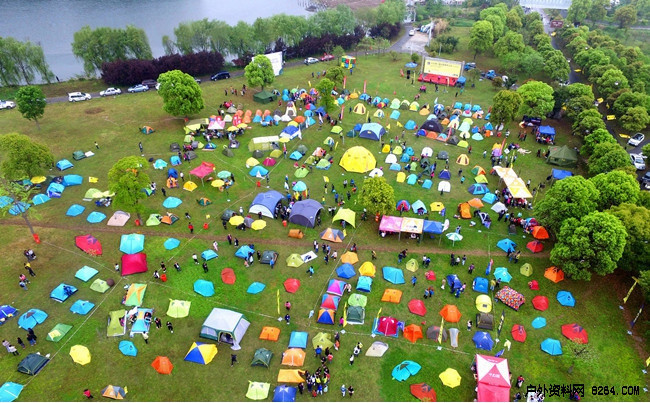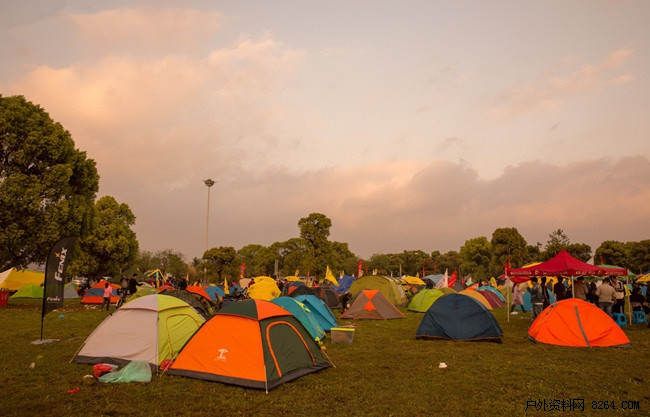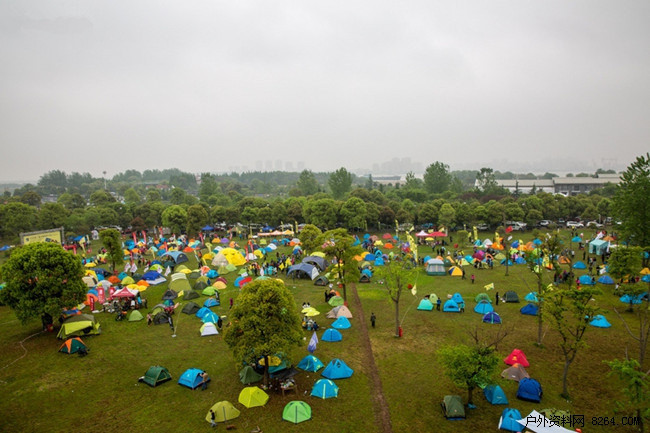How to choose a campsite

Camping, English (Cam), evolved from English, English, originated from the name of the "guardian camp" of the Roman defending force. Modern camping activities originated in the United States, and a brief history of its development can be found in the article (originally from the history of the development of American outdoor camping in 1855).
For outdoor friends, there are short-term hiking or hiking trips, and long-distance activities. It is needless to say that long-distance hiking requires nature camping. So when we go into nature, how do we choose a suitable campsite?
Choice of campsite to consider
1, season and weather;
2. The level and number of participants;
3. Environment and supporting facilities around the camp;
4. The purpose of cooperation with camping needs to be as specific training, good friends vacation, family and children, close to nature, etc.;
Camp choice five basic principles
1, away from danger
2, water supply
3, the formation of the ground
4, back wind backlight
5, other considerations
The choice of camp must first consider the safety of the camp - that is, the camp should be kept away from danger! Secondly, we must fully consider the comfort of camp sleep and the convenience of living functions such as catering, entertainment, washing, and sanitation under the premise of safe and secure protection from dangers. Third, we must also select camps that minimize impact on the natural environment according to local conditions. The environmental law of LNT (stepping through no trace) is to try to camp and live in camps that can tolerate the ground and the minimum impact on campsite water sources.

1, away from danger
1) Do not under the cliff or the edge of a steep slope; prevent accidental casualties such as falling rocks, landslides, landslides, and avalanches;
The camp was chosen below the cliff. Once the wind blows on the mountain, it may cause accidents such as stone scraping; in particular, the loosely sloped slopes of the soil, or the steeply weathered and broken slopes, suddenly change during the night. When rainstorm observation is difficult, collective disasters such as landslides, landslides and avalanches can easily occur.
2) Do not under the dead wood or the hive; avoid "wild bees and butterflies" and casualties caused by dead trees and dead trees;
In Hainan Island, there have been many cases of camping or resting under coconut trees. The mature coconut “Gu’erty cooked†winds blow and hurt people; outdoor camping wears yellow eye-catching clothes or sprays pollen scented perfume and is taken in the camp. The case of the wasp attack has also been heard.
3) Do not avoid being struck by lightning strikes on the top of a mountain or directly under a tree.
In the rainy season or in the thunderstorm area, the camp must not be selected on high ground, under high trees, or on relatively isolated ground. It is very easy to attract lightning strikes; some lightning strikes do not always “blast†from high places and flash from the sides. The "Flash Thunder" can also cause death.
4) Do not insulate animal animals from animals and avoid animal harassment and injury.
The animals that have lived in this land for many years are the masters of this land. We are merely rushing through guests and visiting guests and homes in the “Master†home. Making roads and harassment is the best choice, and it is also an outdoor basic character.
5) Don't camp on floodplains, rivers, river turns, and confluence of small rivers to prevent sudden floods; camp on shores of sea (river) and pay attention to the traces and time patterns of tidal flows;
Some rivers have power plants in the upper reaches of the river. During the impoundment, the riverbank is wide and the water flow is small. Once the water is discharged, it will overflow into the riverbank; the river turns inside, and it is more likely to be rushed by danger in the event of sudden floods; camping on the shore of the sea (river) Observe the traces of the tide. The camp must be higher than the water mark line, and calculate and pay attention to the high and low time of the tide fluctuations on the day.
6) Do not camp at the center of the valley, at the bottom of the valley, or at the center of the stream.
Upstream rainfall and reservoir discharge, floods and raids can lead to collective disasters; some streams usually have small flows, but once a rainstorm occurs, floods or flash floods may occur, especially in rainy seasons and flood-prone areas. Choose to camp in the middle of the river (the valley) valley or in the middle more than the big rock or highland platform, due to the heavy rain in the upper reaches of the river, every year by the flash floods washed away the water and the fate of the death occurred.
7) When camping in remote areas, you must understand and follow local customs and customs, and be sure to pay attention to public security warnings. Many outdoor travel enthusiasts like to travel and camp in areas with rich natural resources and beautiful surroundings in the northwest of China. Due to the unbalanced development between regions in China, the gap between the rich and the poor in economic development between the eastern and western regions is relatively large. Therefore, when we go to the western region to participate in outdoor trips, we must understand and respect the local customs and culture when choosing camping places for outdoor life. We also need to know in detail the past conflicts between planned and camping areas, such as interpersonal conflicts, to avoid such risks. Personal casualties and property damage caused.
2, near water supply:
After a long day of heavy exercise, it is very important to have water supplies near the campsite. For one, you don’t have to carry water for many days, and you have to use a lot of potable water to increase your physical fitness. The two camps have water supply and can use the water in the camp, such as catering, washing, and hygiene. .

3, the formation of the ground
The ideal campground should be: flat, dry and not damp
1) The ground: It is better to use flat and dry ground, do not prick, and have bumps and bumps; generally slopes with a slope of no more than 10 degrees are generally used as camping grounds.
2) Geology: It is better that the gypsum has good geological water permeability; clay and mud will stick to the ground due to rain and moisture;
3) Drainage: no moisture, smooth drainage, dry, not in low-lying wetlands and slow drainage;
4) Plants: Do not use in shrubs, woods, haystacks, bushes, etc.; uneven spots can be filled with soil, thatch, deciduous, etc.; do not move camp stones freely. This will make camps uneven and damaged. Ecological balance.
5) Drainage Ditch: Now the tents are designed with precision and are made of waterproof material. Unless you are forced to camp on low ground, please take care of the environment and do not dig drains.
In the dark and humid environment of the virgin forest, you can collect dry leaves, hay, and the like underneath the tent; however, you must not cut down the branches, contrary to the LNT's minimum impact on the environment.
In addition to getting up early in the morning, it is important to look closely for animals such as poisonous snakes and grasshoppers, and whether they have climbed into backpacks or shoes to be warm and bitten.
4, back wind backlight
1) Camp leeward backlighting is the key to whether or not you can rest in sleep, especially in some valleys and river banks where camping should be chosen.
2) The tent is not to face the wind in the direction of the door but carrying the wind, camping in the cold will feel warmer;
3) If it is a camp that requires more than two days of residence, one should choose to camp in a shaded place; if the location is chosen to avoid sunshine in the east, then the morning supper can avoid direct sunlight;
4) If you are under the big tree and on the north side of the mountain, it is best to take a photo of the sun as early as the sunset sun, so if you rest during the day, the tent will not be too hot;
5, other need to consider
1) Transportation: The traffic is convenient. There are good villages nearby. When you are close to the village, you must be near the road at the same time. If there are any accidents, this will facilitate the transfer of the camp and help. But you must leave the dwellings and roads to avoid harassment or accidents
2) Public Security: There are nearby places for help or equipment (such as villages and telephones), not too remote
3) Equipment: Other equipment Toilets, barbecue pits, tables and chairs are ideal
4) Animals: Take care to avoid large animal activity

Beach camping is also a mainstream camping method. How to choose a beach camping site? Some experiences share with you:
About the choice of campsite
1, 3 meters away from the highest point of historical tide, in the wave and tide can not reach the zone.
2. In the flat terrain, the surrounding terrain should be shorter than the erection of a tent zone, where the rain cannot flood the zone.
3, no grass, no trees from the grass outside the 1 meter 5 is the best, where pests and pests are difficult to infringement.
4, away from the high platform to prevent the risk of night travel.
5. Choose a place where there is no stone or other danger where you can't drop the damage. It's best to be flat on all sides.
If you want to camp at the beach, be sure to prepare drugs to prevent harmful substances
1. After choosing a campsite, sprinkle sulfur around the campsite with sulfur (anti-snake) or sand bugs to prevent worms from entering the campsite and harming themselves.
2. The tent should be fixed with stones or other things inside and outside the tent to prevent strong winds.
3, point mosquito-repellent incense should pay attention to arson, it is best to use a metal box to install mosquito coils inside, with a breathable hole to disperse mosquito smoke, do not leave the fire outside.
4. In and out of the tent at night, a certain amount of sound must be made beforehand to disturb the harmful substances around the tent and prevent surprise attacks.
5. In and out of the tent at night, it is necessary to check with lights to prevent danger.
In terms of camping in the mountains, many camping sites on the beach are mostly developed spots, and the commercial facilities are relatively complete. The safety factor is generally high.
Anisotropic Bright Diamond Painting
This is a gift that can be sent to colleagues to express sincere concern and gratitude to the company and leadership. You can send friends, and occasionally some small surprises, to express your beautiful heart. Send the family, warm and gentle, and share the beauty at any time. Professionalism, conscientiousness, and attentiveness have always been our goals. Professional equipment, high-quality service, can stand the test of details.
120 bottle set,AB set 60 bottles,C Kit 60 Bottles,B kit 114 bottles
Dongguan Junkai Packaging Products Co., Ltd , https://www.diystoragecase.com